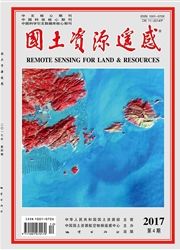

 中文摘要:
中文摘要:
科学合理地定量评估林火烈度,对揭示林火干扰下森林生态系统的变化,以及植被的恢复与管理具有重要意义。以美国科罗拉多大峡谷国家公园北缘的Poplar Fire为实验区,利用Landsat5 TM影像,结合实地调查的综合火烧指数(composite burn index,CBI),分析评价了归一化差值植被指数(normalized difference vegetation index,NDVI),归一化火烧指数(normalized burn ration,NBR),差分归一化植被指数(differenced normalized difference vegetation index,ΔNDVI)和差分归一化火烧指数(differenced normalized burn ration,ΔNBR)4种遥感指数对林火烈度评估的适应性。结果表明,4种遥感指数对识别不同等级林火烈度存在一定的差异。在未过火区和轻度火灾区,单一遥感指数的精度略高于差分遥感指数,其中NBR的提取精度最高,分别达到了66.7%和80%;在中度火灾区和重度火灾区,差分遥感指数的精度高于单一遥感指数,ΔNBR的提取精度最高,分别达到了100%和90%。总体上,基于差分遥感指数的林火烈度制图精度总体高于单一遥感指数,其中ΔNBR的总体制图精度最高,达到了86.2%。因此,ΔNBR是林火烈度分析与评估的适宜遥感指数。
 英文摘要:
英文摘要:
Performing quantitative evaluation of forest fire severity scientifically and reasonably is helpful to revealing the changing of forest ecosystems under fire,and is also of great significance for studying the vegetation recovery and management. Taking the north rim of Grand Canyon National Park in USA as the study area,combined with the composite burn index( CBI) after field survey,the authors used Landsat5 TM images of Poplar Fire to analyze the applicability of NDVI,NBR,ΔNDVI and ΔNBR so as to evaluate fire severity. According to the result obtained,there is some difference between the four remote sensing indices in identifying forest fire intensity of different levels. For non- fire and light fire,indices from a uni- temporal can perform better than indices from bi- temporal( pre and post fire),and NBR has the highest accuracy up to 66. 7% and 80%,respectively; on the contrary,for moderate fire and severe fire,indices from bi- temporal( pre and post fire) can perform better than indices from a uni- temporal,and ΔNBR outperformed the others,because it considers only indices difference resulting from change of vegetation situation and environmental factors caused by forest fire and not affected by surroundings; it has high accuracy of evaluating moderate fire and severe fire,with the accuracy up to 100% and90%. In general,indices from bi- temporal( pre and post fire) have higher overall accuracy than indices from a uni- temporal,and ΔNBR has the highest overall accuracy in evaluating fire severity with the accuracy up to 86.2%,which is hence the most suitable remote sensing indices to evaluate fire severity in this study area.
 同期刊论文项目
同期刊论文项目
 同项目期刊论文
同项目期刊论文
 Simulating multi-objective land use optimization allocation using Multi-agent system—A case study in
Simulating multi-objective land use optimization allocation using Multi-agent system—A case study in Multi-agent based modeling of spatiotemporal dynamical urban growth in developing countries: simulat
Multi-agent based modeling of spatiotemporal dynamical urban growth in developing countries: simulat Multi-agent based modeling of spatiotemporal dynamical urban growth indeveloping countries: simulati
Multi-agent based modeling of spatiotemporal dynamical urban growth indeveloping countries: simulati 期刊信息
期刊信息
